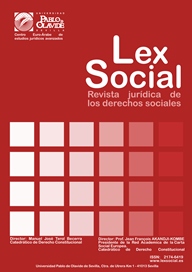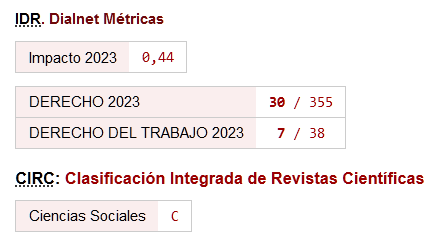Domestic work and collective rights. Some reflections to the thread of RD 1620/2011 and ILO Convention 189
DOI:
https://doi.org/10.46661/lexsocial.5586Keywords:
Domestic service, collective rights, social protection, Convention 189 ILO, trade unions, Turin groupAbstract
the precariousness of many of the labor relations that support the service of the family home hinders union activity. In this article, it is analyzed the role assumed by majority traditional trade union (CCOO and UGT) to asumme the employee representation in the social dialogue process. In the C189- Domestic Works Convention, the article 3 says that “Each Member shall, in relation to domestic workers, take the measures set out in this Convention to respect, promote and realize the fundamental principles and rights at work, namely: (a) freedom of association and the effective recognition of the right to collective bargaining and taking measures to ensure that domestic workers and employers of domestic workers enjoy freedom of association and the effective recognition of the right to collective bargaining, Members shall protect the right of domestic workers and employers of domestic workers to establish and, subject to the rules of the organization concerned, to join organizations, federations and confederations of their own choosing.
Downloads
References
BARCELÓN COBEDO, S., “La relación laboral del servicio del hogar familiar tras el RD 1620/2011, de 14 de noviembre.”, Aranzadi Social, vol. 1/2012, n.o BIB 2012512.
BAYLOS GRAU, A., “La acción sindical ante el fenómeno de la economía sumergida”, en Monereo Pérez, J. L., Perán Quesada, S. (eds.) Derecho social y trabajo informal: implicaciones laborales, económicas y de Seguridad Social del fenómeno del trabajo informal y de la economía sumergida en España y Latinoamérica, Comares, Granada, 2016.
CUEVA PUENTE, C., La relación laboral especial de los empleados de hogar, Lex Nova, Valladolid, 2005.
JHONSTON, H.; LAND-KAZLAUSKAS, C., Representación, voz y negociación colectiva: la sindicalización en la economía del trabajo esporádico y por encargo, ILO, Ginebra, 2018.
LIMÓN LUQUE, M. A., Derecho de reunión y relaciones laborales: el derecho de asamblea en la empresa, CES, Madrid, 1996.
MATHHER, C., Los trabajadores domésticos en Europa se organizan, EFFAT, Bruselas, 2015.
RODRÍGUEZ SÁNCHEZ, R., La protección de los derechos colectivos en las relaciones laborales especiales, Rovira i Virgil, Tarrragona, 2004.
SANDE PÉREZ-BEDMAR, M., “La relación laboral especial de los empleados de hogar:aspectos laborales y de seguridad social”, Revista jurídica Universidad Autónoma de Madrid, vol. 23, 2011.
SÁNZ SÁEZ, C., Derechos colectivos y empleadas del hogar: reformas jurídicas inaplazables para un trabajo decente del trabajo doméstico en España, fecha de consulta 6 mayo 2019, en https://www.ccoo.es/99d7ae8ee035fef57c16d423f2cb62eb000001.pdf.
TRILLO PÁRRAGA, F., “Economía digitalizada y relaciones de trabajo”, Revista de Derecho Social, vol. 76, 2016.
Downloads
Published
How to Cite
Issue
Section
License
Copyright (c) 2019 Lex Social: Revista de Derechos Sociales

This work is licensed under a Creative Commons Attribution-NonCommercial-NoDerivatives 4.0 International License.
-
Atribución — Usted debe dar crédito de manera adecuada, brindar un enlace a la licencia, e indicar si se han realizado cambios. Puede hacerlo en cualquier forma razonable, pero no de forma tal que sugiera que usted o su uso tienen el apoyo de la licenciante.
-
NoComercial — Usted no puede hacer uso del material con propósitos comerciales.
-
CompartirIgual — Si remezcla, transforma o crea a partir del material, deberá difundir sus contribuciones bajo la misma licencia que el original.



 @Lex Social
@Lex Social Linkedin
Linkedin @lexrevista.bsky.social
@lexrevista.bsky.social


